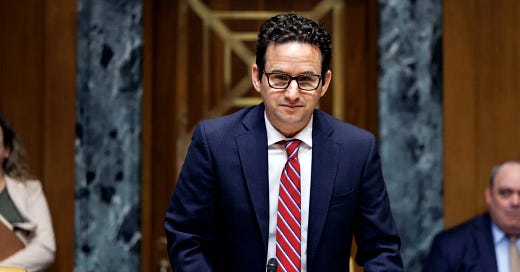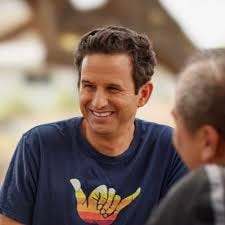Remember a few days ago when, for the fourth time in as many months, I suggested that Chuck Schumer needs to step down? Who did I offer as a replacement? Well, I didn’t have an answer.
Maybe I still don’t, but I am doing some homework on who isn’t at the front of the AOC soundbite breadline but should be. Those who may not be wowing you with goosebumps but are certainly getting the job done.
If we are learning anything in this moment of truth, it’s that we have to stop following the shiny objects (like AOC and Bernie), who seem to make us feel good but aren’t getting it done.
Enter my new person of interest, Brian Schatz. He isn’t a household name, but he should be. He’s the kind of politician who actually gets things done—quietly, effectively, and without the grandstanding that dominates so much of today’s political landscape. As Hawaii’s senior senator, he’s been a force on climate action, consumer protection, and democratic reforms, all while maintaining a level of pragmatism that makes real progress possible. In our party, which we must start to acknowledge struggles to balance vision with execution, Schatz is proving that it’s possible to do both.
I should have taken notice of Schatz back in 2014 when he organized an overnight talkathon in the Senate to draw attention to the urgency of climate change. He got more than two dozen Senate Democrats on board, forcing the issue into the spotlight. It was a rare moment of coordinated effort on an issue that too often gets buried under more immediate political fights. He wasn’t posturing—he was setting the groundwork for long-term action.
I put this in front of you because this man is not new to the stage. He just hasn’t taken center stage—yet.
More recently, Schatz showed his strategic instincts by announcing he’d block Senate votes on President Trump’s diplomatic nominees. It wasn’t some random protest—it was a calculated move to stop Trump from dismantling the U.S. Agency for International Development (USAID) by merging it into the State Department. Schatz knew what was at stake: a massive shift in how America provides humanitarian aid and supports democracy worldwide. And he was willing to use every tool at his disposal to stop it.
Beyond these headline moments, Schatz has been relentless in securing real wins. As chairman of the Senate Committee on Indian Affairs, he’s fought to bring federal resources to Native Hawaiian and Indigenous communities. As a member of the Senate Appropriations Committee, he’s delivered major investments in housing, infrastructure, and disaster relief—proving he can translate policy into action. And when it comes to tech and consumer protection, he’s ahead of the curve, pushing for stronger cybersecurity measures and data privacy protections long before most of Washington caught on.
So who is this guy, really? A little history. Schatz was born in Ann Arbor, Michigan, in 1972 but moved to Hawaii when he was just two years old. He grew up in Honolulu, attending the prestigious Punahou School—yes, the same school that produced Barack Obama—before heading to Pomona College in California, where he studied philosophy. His background isn’t the usual pipeline of law school to politics. Before he got into government, he ran Helping Hands Hawaii, one of the state’s largest social service organizations. He saw firsthand what people needed and how public policy could make or break a community. That experience shaped his entire approach to governance: results over rhetoric, action over ideology.
Schatz first jumped into politics in 1998, winning a seat in the Hawaii House of Representatives, where he served for eight years. After that, he led the Democratic Party of Hawaii and then became the state’s lieutenant governor in 2010. When longtime Senator Daniel Inouye passed away in 2012, Schatz was appointed to fill his seat, and he’s been proving his worth in Washington ever since.
And while Schatz isn’t the flashiest name in the Senate, he’s built a strong base of support. His campaign donations come from a mix of grassroots donors, large individual contributions, and political action committees (PACs). During the most recent election cycles, about 46% of his campaign funding came from large individual donors, while PACs contributed around 43%. He’s also a powerhouse fundraiser for fellow Democrats, pulling in over $1 million for the Democratic Senatorial Campaign Committee’s Blue Green Council, which focuses on climate-related initiatives.
But what really stands out to me about Schatz is that he embodies the kind of leadership the Democratic Party desperately needs—progressive, disciplined, and capable. He understands that big ideas only matter if you can make them a reality. And while he may not be making headlines every day, the work he’s doing is shaping the future of the party and the country.
Here’s the thing. We, the people, can put men and women like Schatz in our media and forward this to others who are also searching for those who do more than talk the talk. The more we follow and support people like Brian (can I call him by his first name?), the better our future becomes.
Ask the media leaders why they aren’t interviewing him. Send his info to friends. Follow him. Support him. Call his office. Hell, call Nicolle Wallace and ask her to have him on! Put the question to her social media. #WhyAreYouNotInterviewingBrianSchatz?
If you want to follow along, he’s worth a look. You can find him here:
• Website
• X https://twitter.com/brianschatz
• YouTube






Jason Crow, Colorado’s 6th Congressional District.
How about this group begin to compile a list!